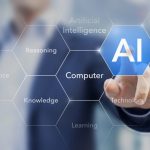Preparing for the rise of AI in the workforce
3 attacks you'd miss without AI

There has been a lot of hype around AI to the point where some people are simply tuning it out. I think this is a mistake. While there are limits to what AI can do, there also are sophisticated attacks that we’d miss without it.
The need for AI is driven by three fundamental yet significant changes in the enterprise computing environment.
81 percent of SMEs think AI is crucial to cyber security

New research from threat detection specialist Senseon looking at the state of cyber security in SMEs reveals increasing uncertainty about whether the investment into the security solutions they’re currently using is worth the cost.
The survey also reveals that SMEs have been slow to implement AI solutions, despite the vast majority of SMEs surveyed (81 percent) thinking that AI will be fundamental to the future of cyber security.
How AI is impacting security in 2019

In 2019, cyber threats are occurring at a rapid pace. In fact, cyber attacks are the fastest growing crime globally and are continuously increasing in sophistication, size, and impact. At the same time, the number of qualified cybersecurity professionals is dwindling. In a recent blog post, Ann Johnson, the head of Microsoft’s cybersecurity solutions group, used estimated data from the research firm Cybersecurity Ventures to project a shortage of about 3.5 million qualified cybersecurity workers by 2022.
Artificial intelligence (AI) can serve as a helpful tool in cybersecurity. AI can help businesses of all sizes and across many industries better prepare for impending security threats. Here are three of the most impactful benefits of AI in online security:
Quality issues with training data are holding back AI projects

For many organizations, AI and machine learning are seen as a route to greater efficiency and competitive advantage.
But according to a new study conducted by Dimensional Research for Alegion almost eight out of 10 enterprise organizations currently engaged in AI and ML report that projects have stalled, and 96 percent of these companies have run into problems with data quality, data labeling required to train AI, and building model confidence.
New self-service platform helps developers apply AI at the edge

In the past AI has mostly depended on expensive solutions running in the cloud, restricting its use to a relatively small number of companies.
But with the growth of the IoT and ever greater volumes of information that need to be processed fast, there's more demand for AI at the edge. Xnor is launching a new self-service platform called AI2GO, that enables developers, device creators and companies to build smart, edge-based solutions without needing training or background in AI.
AI-driven platform brings automation to field service organizations

As technology becomes increasingly complex and more devices are connected to the IoT, so the volume and complexity of field service requests increases too.
To help deal with this, automation company Zinier is launching its new Intelligent Service Automation and Control (ISAC) platform, an AI-driven solution enabling field service organizations to operate more efficiently.
Microsoft's core platform isn't software, it's trust

For the first time in a half-decade, I watched a Microsoft Build keynote this morning. Time gives fresh perspective, looking at where the company was compared to where it is today. Listening to CEO Satya Nadella and other Softies, I repeatedly found myself reminded of Isaac Asimov's three laws or Robotics and how they might realistically be applied in the 21st Century. The rules, whether wise or not, set to ensure that humans could safely interact with complex, thinking machines. In Asimov's science fiction stories, the laws were core components of the automaton's brain—baked in, so to speak, and thus inviolable. They were there by design; foundationally.
Behind all product design, there are principles. During the Steve Jobs era, simplicity was among Apple's main design ethics. As today's developer conference keynote reminds, Microsoft embraces something broader—design ethics that harken back to the company's founding objectives and others that share similar purpose as the robotic laws. On the latter point, Nadella repeatedly spoke about "trust" and "collective responsibility". These are fundamental principles of design, particularly as Artificial Intelligence usage expands and more corporate developers depend on cloud computing platforms like Azure.
Virtual support agent streamlines service desk management

One of the biggest challenges for service desk teams is striking the right balance between business-critical projects and keeping up with everyday problems and requests.
To help relieve this problem, ManageEngine, the IT management division of Zoho, is incorporating Zia, Zoho's AI assistant, as a virtual IT support agent in its cloud-based service desk software, ServiceDesk Plus.
AI-powered predictive engagement helps businesses keep customers

New research from customer engagement company Freshworks reveals that 56 percent of consumers are willing to drop a brand after a single bad experience.
The survey of 3,000 individual consumers across the US, UK, Germany, France, India, and Australia, demonstrates that 69 percent have a clear preference for brands that offer proactive notifications and service.
In praise of the autoencoder

When you consider all the machine learning (ML) algorithms, you’ll find there is a subset of very pragmatic ones: neural networks. They usually require no statistical hypothesis and no specific data preparation except for normalization. The power of each network lies in its architecture, its activation functions, its regularization terms, plus a few other features.
When you consider architectures for neural networks, there is a very versatile one that can serve a variety of purposes -- two in particular: detection of unknown unexpected events and dimensionality reduction of the input space. This neural network is called autoencoder.
Digital transformation? Don't ask me

According to new research among British businesses, 57 percent of employees either don't understand (20 percent) or misinterpret (37 percent) the meaning of 'digital transformation'.
The research, conducted by YouGov among employees at 500 businesses with 50 or more employees, on behalf of service management Cherwell Software also finds that 64 percent say their employers only adopt new technology once it enters the mainstream.
The next industry to be drastically changed by AI: Oil and gas

Back in 2015, Shell launched an artificial intelligence-powered assistant for their lubricant service customers. Represented by digital avatars Emma and Ethan, the assistant assists customers with lubricant-related questions and concerns. It’s available around the clock, which means people can reach out at any time of the day or night and receive answers in seconds.
Shell claims that the assistant can handle over 100,000 data sheets for 3,000 products, and understands 16,500 physical characteristics of lubricants. The technology can also provide detailed information to customers about more than 18,500 pack sizes.
Google closes down its AI ethics council just one week after its launch

Google has announced that it is closing down its artificial intelligence ethics council following controversy about board members. The Advanced Technology External Advisory Council (ATEAC) was formed just a week ago, but there was strong criticism of the decision to appoint Heritage Foundation president Kay Coles James to the board.
Rightwinger James has a history of opposing LGBTQ rights, and dozens of Google employees signed a petition in protest at her board membership. In response, Google has said that it is "going back the drawing board" and is ending the council.
Marketers have high hopes for artificial intelligence

There's strong interest in and high expectations of AI from B2B marketing and sales professionals, with 84 percent of participants in a new study currently planning, evaluating, implementing or using it.
Account-based marketing company Demandbase has revealed the results of the survey conducted in conjunction with Salesforce Pardot and global research firm, Demand Metric.
Recent Headlines
BetaNews, your source for breaking tech news, reviews, and in-depth reporting since 1998.
© 1998-2025 BetaNews, Inc. All Rights Reserved. About Us - Privacy Policy - Cookie Policy - Sitemap.
